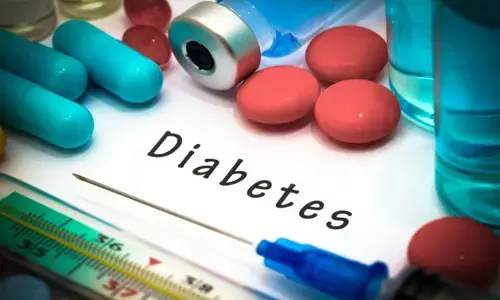- Home
- Medical news & Guidelines
- Anesthesiology
- Cardiology and CTVS
- Critical Care
- Dentistry
- Dermatology
- Diabetes and Endocrinology
- ENT
- Gastroenterology
- Medicine
- Nephrology
- Neurology
- Obstretics-Gynaecology
- Oncology
- Ophthalmology
- Orthopaedics
- Pediatrics-Neonatology
- Psychiatry
- Pulmonology
- Radiology
- Surgery
- Urology
- Laboratory Medicine
- Diet
- Nursing
- Paramedical
- Physiotherapy
- Health news
- Fact Check
- Bone Health Fact Check
- Brain Health Fact Check
- Cancer Related Fact Check
- Child Care Fact Check
- Dental and oral health fact check
- Diabetes and metabolic health fact check
- Diet and Nutrition Fact Check
- Eye and ENT Care Fact Check
- Fitness fact check
- Gut health fact check
- Heart health fact check
- Kidney health fact check
- Medical education fact check
- Men's health fact check
- Respiratory fact check
- Skin and hair care fact check
- Vaccine and Immunization fact check
- Women's health fact check
- AYUSH
- State News
- Andaman and Nicobar Islands
- Andhra Pradesh
- Arunachal Pradesh
- Assam
- Bihar
- Chandigarh
- Chattisgarh
- Dadra and Nagar Haveli
- Daman and Diu
- Delhi
- Goa
- Gujarat
- Haryana
- Himachal Pradesh
- Jammu & Kashmir
- Jharkhand
- Karnataka
- Kerala
- Ladakh
- Lakshadweep
- Madhya Pradesh
- Maharashtra
- Manipur
- Meghalaya
- Mizoram
- Nagaland
- Odisha
- Puducherry
- Punjab
- Rajasthan
- Sikkim
- Tamil Nadu
- Telangana
- Tripura
- Uttar Pradesh
- Uttrakhand
- West Bengal
- Medical Education
- Industry
Diabetes management in the wilderness setting: WMS Guidelines

Philadelphia: The Wilderness Medical Society (WMS) has released new clinical practise guidelines on diabetes management in the wilderness setting in a supplement to Wilderness & Environmental Medicine. This issue features updates to previously published clinical practice guidelines and newly developed guidelines on diabetes management in the wilderness setting. Updated guidelines published in Wilderness & Environmental Medicine provide most up-to-date and relevant clinical information to frontline providers in the wilderness or austere environments incl new guidelines on diabetes management
New clinical practice guidelines include:
Clinical practice guidelines for diabetes management
Athletes with both type 1 and type 2 diabetes are undertaking ever-expanding wilderness challenges. At least three individuals with diabetes have successfully reached the summit of Mount Everest. In a recent survey, people who self-identified as having diabetes represented seven per cent of 3,000 surveyed ultramarathon runners. Both high and low blood sugar can be catastrophic in environments where there are limited resources, and glycemic control is more challenging in extreme conditions, needing additional monitoring, treatment adjustments, and careful planning beforehand.
The authors of a new guideline on diabetes management point out that there are so many variables that it is impossible to come up with a single set of guidelines.
- They recommend personalizing the medical care of each individual based on personal history and input, and advise adjusting insulin doses and diet plans according to the type and degree of activity that will be performed;
- An individual's baseline level of fitness; the individual's athletic and disease history; and the environment to which the athlete will be exposed.
- They also recommend that athletes with diabetes should carry a basic written plan developed with their endocrinologist describing their usual treatment regimen; a plan for basic adjustments in the backcountry;
- Basics of hypo-/hyperglycemia management.
- An emergency action plan.
PREPARTICIPATION MEDICAL EVALUATION AND COUNSELING
- Diabetes-specific healthcare maintenance should be up to date prior to wilderness activity. Athletes with diabetes may need to undergo additional and more frequent speciality evaluations (Evidence grade: 1C).
- Athletes with diabetes should meet with their primary care provider and/or endocrinologist prior to wilderness travel (Evidence grade: 1C).
Cardiovascular screening
- Individuals with diabetes should undergo comprehensive risk assessment for cardiovascular disease with their primary care provider and/or endocrinologist prior to wilderness travel (Evidence grade: 1B).
- Routine pre-participation ECG screening of wilderness athletes with diabetes is not recommended (Evidence grade: 2C).
- Routine exercise ECG to screen for coronary artery disease in asymptomatic wilderness athletes with diabetes is not recommended (Evidence grade: 1B).
Source : Wilderness & Environmental Medicine
Dr Kamal Kant Kohli-MBBS, DTCD- a chest specialist with more than 30 years of practice and a flair for writing clinical articles, Dr Kamal Kant Kohli joined Medical Dialogues as a Chief Editor of Medical News. Besides writing articles, as an editor, he proofreads and verifies all the medical content published on Medical Dialogues including those coming from journals, studies,medical conferences,guidelines etc. Email: drkohli@medicaldialogues.in. Contact no. 011-43720751


